
Strengthen the means of implementation and revitalize the Global Partnership for Sustainable Development
Universitas Indonesia (UI) continuously strengthens our commitment to the Sustainable Development Goals (SDGs) through collaboration with various Non-Governmental Organizations (NGOs) and cross-sectoral partners in community engagement, research, and educational resource development.
A tangible example of this collaboration is the community service initiative carried out in the Indigenous Baduy Community in Lebak, Banten. The UI Community Service team, in partnership with the local NGO Yayasan Spirit Membangun Ukhuwah Islamiyah (YASMUI), delivered health education and vital health checks. This project focused on improving health literacy and empowering local residents to adopt sustainable healthy lifestyles, demonstrating a community-based collaboration aligned with SDG 3 (Good Health) and SDG 10 (Reduced Inequalities).
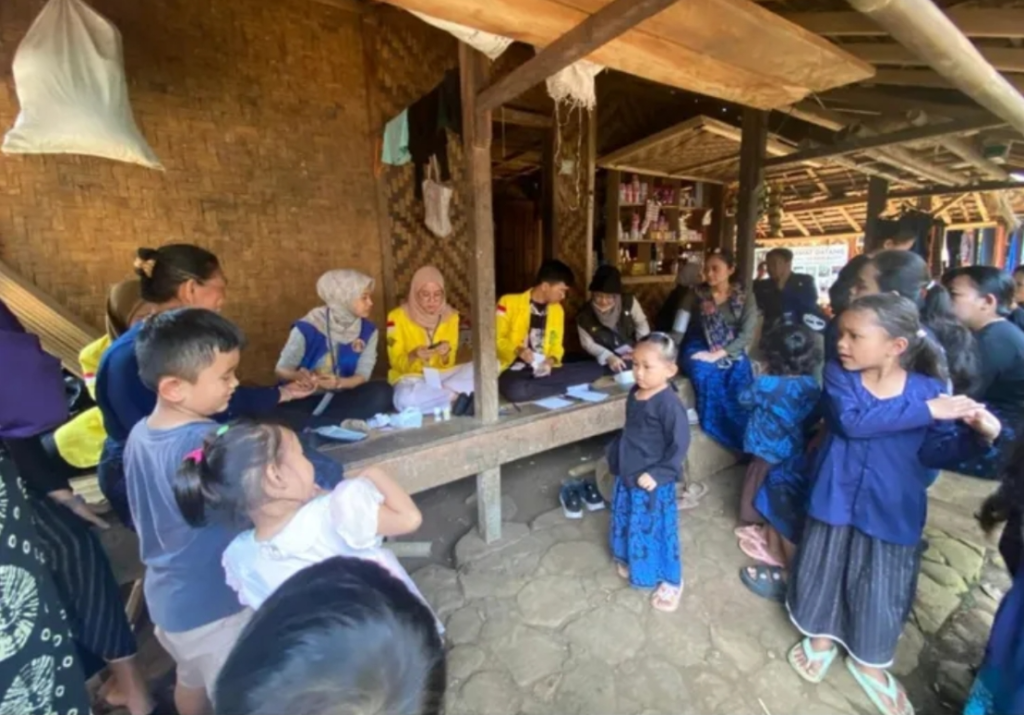
Furthermore, the Faculty of Administrative Sciences (FIA), through its ICG Cluster, collaborated with the SDGs Hub UI and an NGO partner in the program: “SDGs for Villages: Strengthening the Capacity of Village Officials for a Sustainable Future.” This initiative aimed to enhance sustainability literacy, village governance, and the administrative capacity of local government officials in designing SDGs-based local policies. This cross-sectoral collaboration effectively instilled sustainability literacy and policy empowerment at the grassroots level.
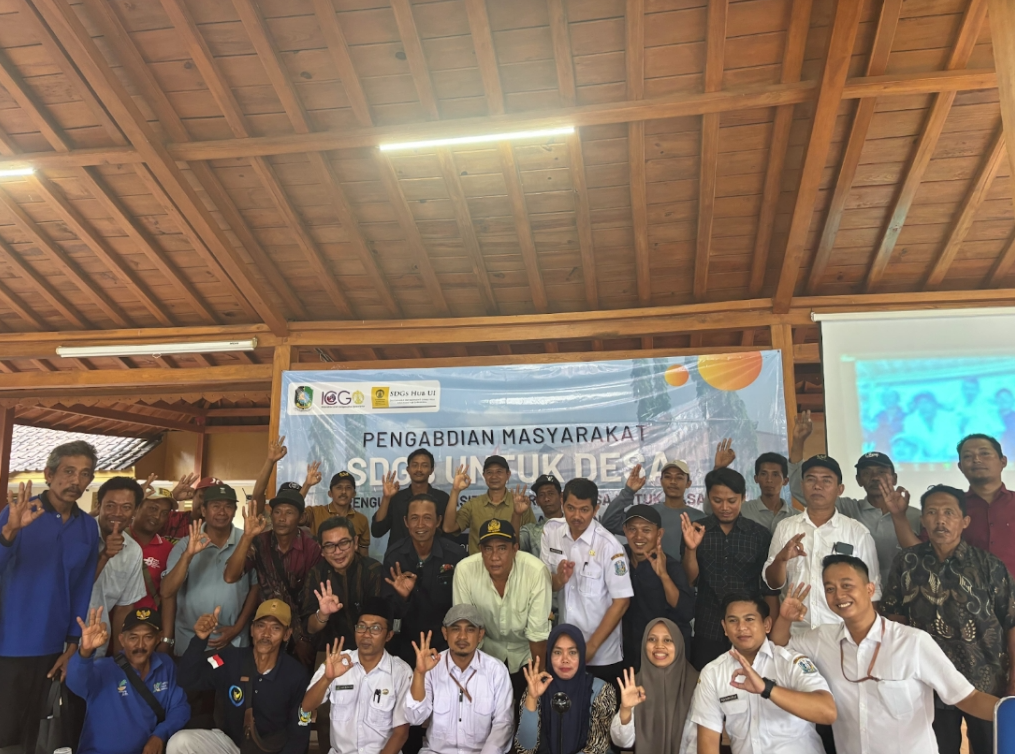

Finally, the Faculty of Social and Political Sciences (FISIP) expanded its academic and social collaboration by signing Cooperation Agreements (PKS) with five partner institutions, including national NGOs and social research bodies. This formal partnership focuses on fulfilling the Tridarma (Three Pillars of Higher Education) through joint research, student volunteering programs, and the development of educational resources that support the SDGs in the areas of social justice, governance, and public service.
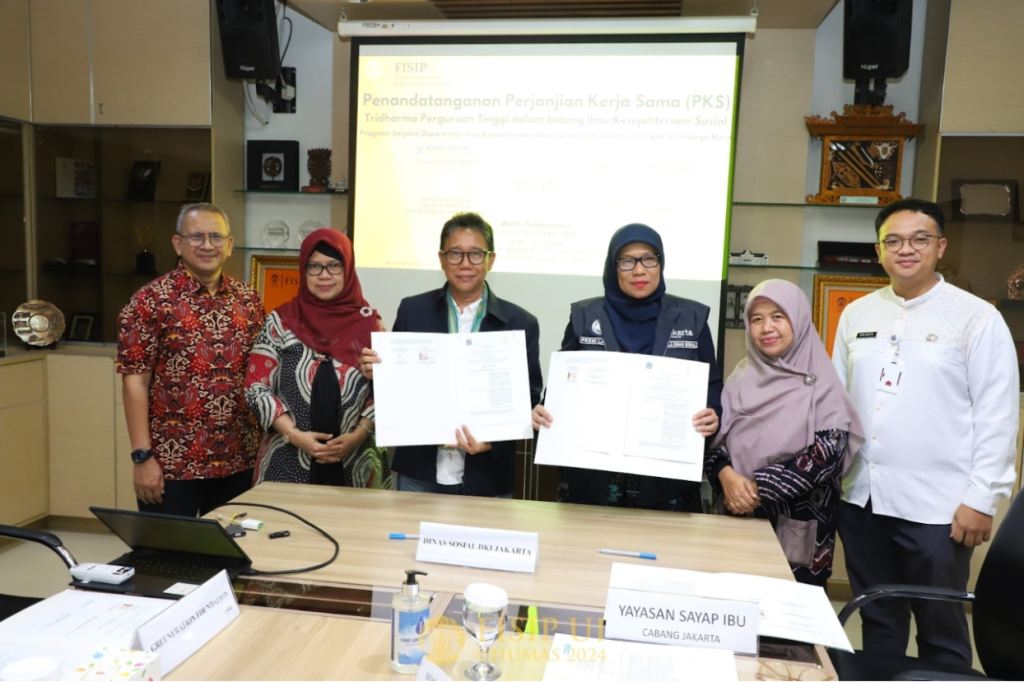
In addition to the initiatives above, UI’s community service activity in Motaain, Atambua, Nusa Tenggara Timur (NTT) combined formal and informal learning with direct health interventions under the theme Atambua Menggapai Pelita. The health outreach took place at Gereja Kapela St. Mikhael Seroja and was attended by more than 50 community members, offering services such as height and weight checks, blood pressure screening, blood sugar and uric acid tests, dental and oral health examinations, and health counseling to raise basic health awareness and bring care closer to hard-to-reach population. Educational components included fun-learning formal classes and multiple informal modules such as Indonesian Culture Class, Introduction to Professions Class, Digital Literacy Class for Teachers, Balanced Nutrition Class, Arts Class, and Environmental Commander Class; and the team also left tangible infrastructure at Inpres Motaain Primary School, notably handwashing and toothbrushing stations, which school leaders and local officials praised as lasting community benefits
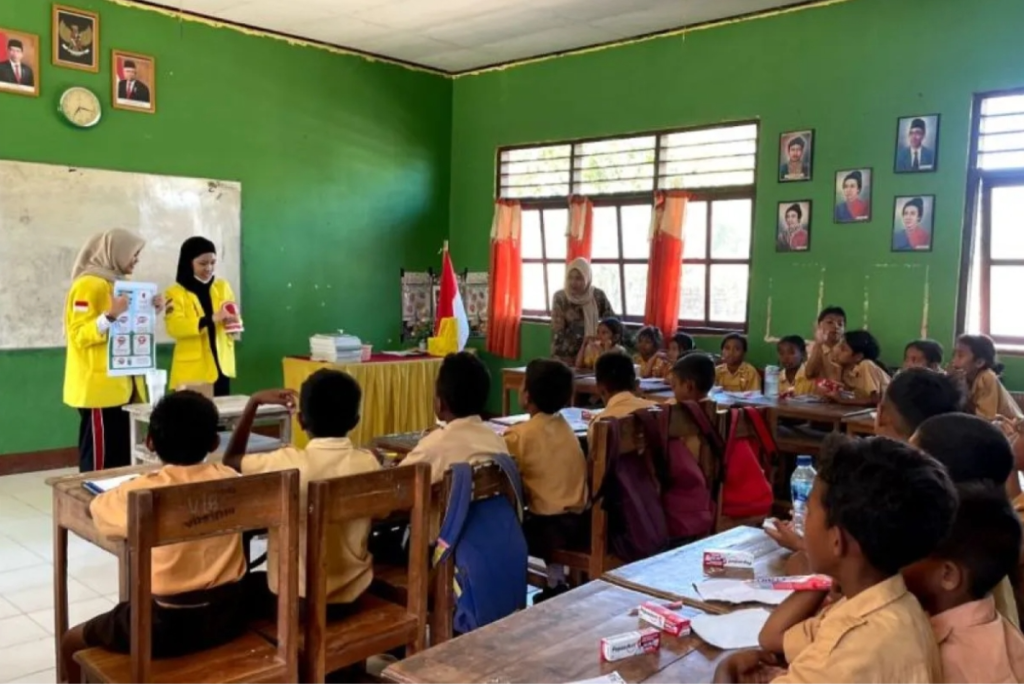
These initiatives collectively illustrate UI’s role beyond campus boundaries. By actively engaging with NGOs and civil society organizations, UI demonstrates itself as a key institution that creates measurable social impact and expands the implementation of the SDGs through synergy between academics, NGOs, local government, and the wider community.
Universitas Indonesia demonstrates a deep and direct institutional commitment to education for sustainable development by extensively incorporating the SDGs into our core education curriculum. This dedication is immediately traceable through a sizable portfolio of study programs designed to equip our students with the essential knowledge and skills needed to tackle global sustainability challenges.
A grand total of 364 of our study programs directly relate to the 17 SDGs. This comprehensive integration ensures that the principles of sustainable development are not siloed but are woven into various academic disciplines across the university. Our strategy focuses on developing curricula based on current and future societal needs, guaranteeing that our learning outcomes align with the global context. By doing this, we ensure our graduates are prepared to contribute meaningfully both nationally and internationally.
The development and delivery of these SDG-related courses are spearheaded by our dedicated faculty members who specialize in various topics across all 17 goals. Crucially, these educators are active researchers, ensuring they are consistently up-to-date with the latest SDG trends, data, and policy developments. This active engagement in research allows them to deliver the most current and relevant knowledge directly during classes, providing students with cutting-edge insights. Through the systematic embedding of these global goals within our course offerings and the research-driven expertise of our teaching staff, we underscore our position as a frontrunner in integrating the SDGs into higher education.
Universitas Indonesia demonstrates a robust and multi-faceted commitment to advancing the Sustainable Development Goals (SDGs) by providing dedicated outreach educational activities for the wider community throughout 2024. This strategy ensures that critical knowledge transfer reaches all segments of society, from local communities to global populations, including those who are geographically displaced.
Direct Engagement with the Local Community
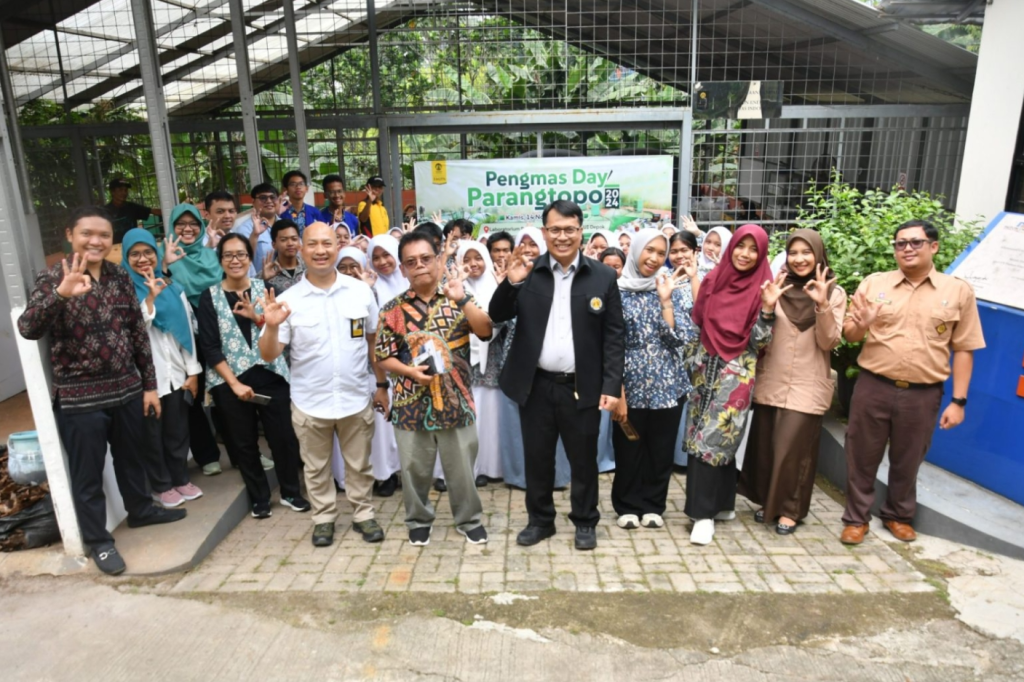
UI continuously engages with local communities through its focused educational programs. A prime example is the “Pengmas Day” event organized by the Faculty of Mathematics and Natural Sciences (FMIPA) in 2024. This hands-on program was dedicated to educating local residents and the younger generation on environmental stewardship, emphasizing the use of education and technology to foster a caring and proactive attitude toward the environment. This direct engagement ensures that local residents are practically equipped with the knowledge and skills necessary to support the national achievement of the SDGs.
SDG Education for Alumni
UI provides a set of dedicated courses and short trainings that explicitly address sustainability-related skills. There are a total of 13 course categories with a combined 713 alumni participants recorded in the 2024 tracer study. These courses contribute to SDG learning and capacity building, ranging from digital literacy to professional certification and the arts.
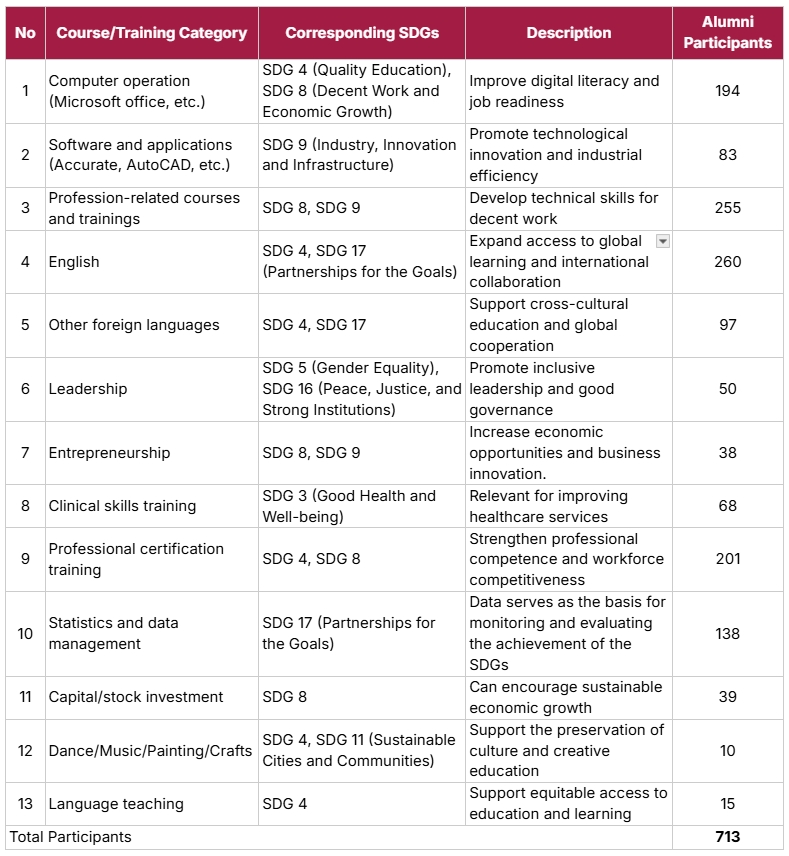
Web-Based Accessibility for Global Reach: Alumni, Displaced People, and Refugees
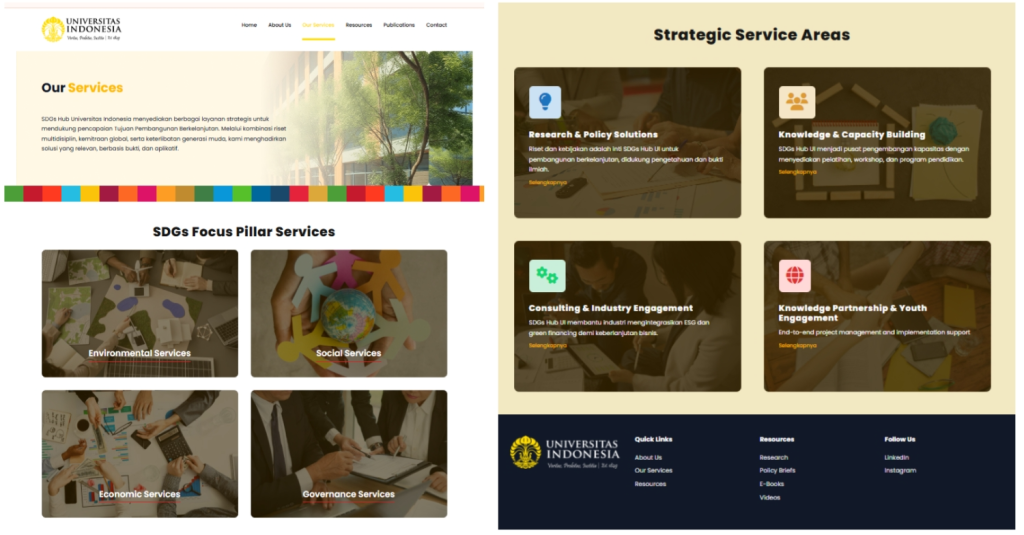
To ensure broad, equitable, and unrestricted access to crucial SDGs knowledge, UI operates the SDGs Hub as an open, web-based resource accessible here. Since this service is available online and free of geographical restriction, the resources and knowledge provided are easily accessible to alumni, the local community, and critically, displaced people and refugees globally. This digital strategy ensures that foundational knowledge about the SDGs and UI’s research initiatives can be accessed by anyone, anywhere, at any time.
Strategic Analysis Forum to Bridge Policy and Research in SDGs
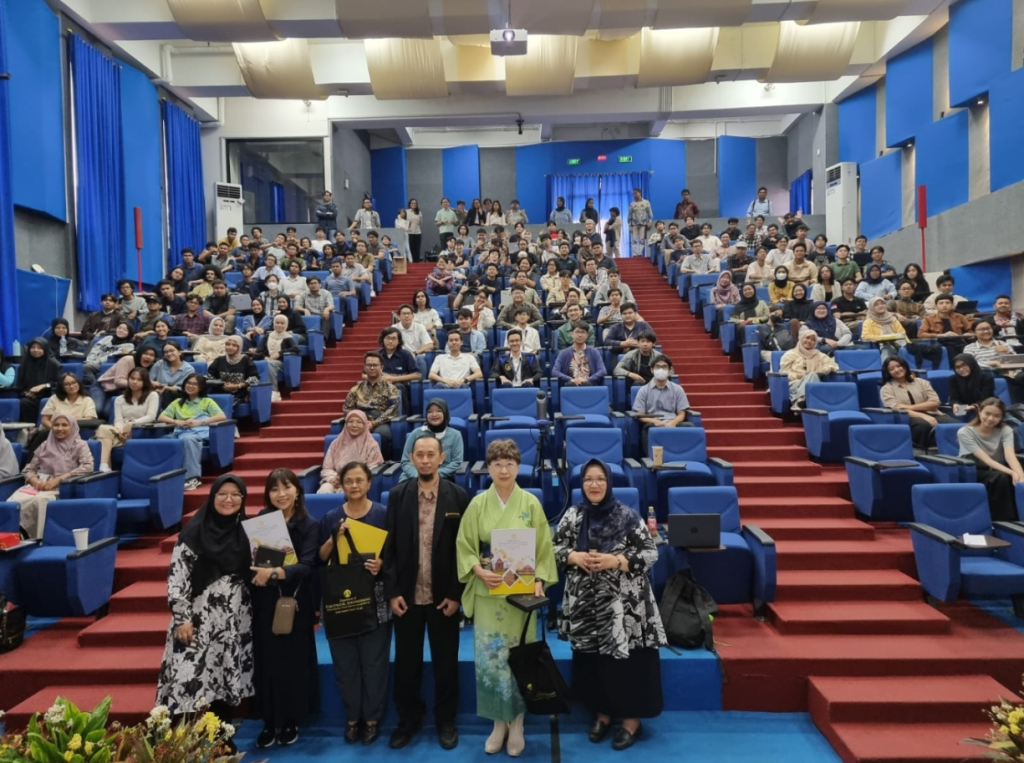
Beyond community outreach, UI academicians also delivered advanced educational programs for key stakeholders. For example, in 2024, the Faculty of Engineering (FT UI) organized a strategic session titled “Analyzing SDGs Achievement in Indonesia with an XAI Technology Approach.” The session acted as a vital knowledge-transfer forum, offering detailed insights into SDG progress that are valuable to policymakers, researchers, alumni, and the broader public involved in implementing national development goals.
By employing these multi-layered approaches, from local community engagement to web-based global access and high-level policy discussions, UI successfully fulfills the mandate of providing dedicated educational outreach activities.